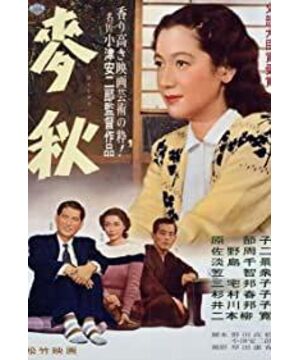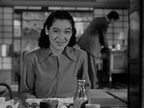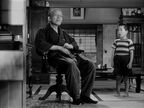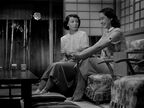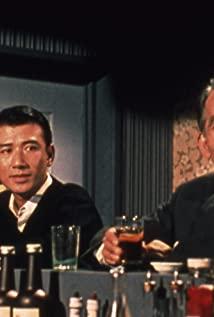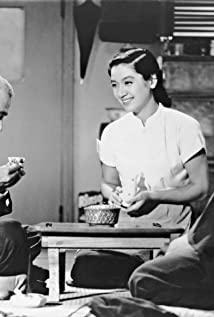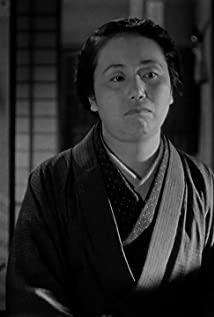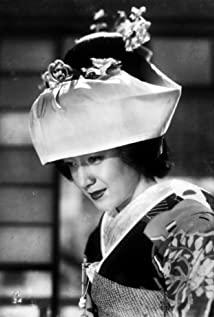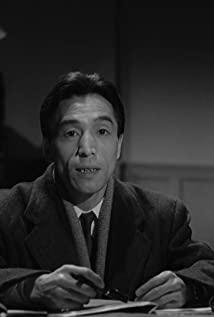"Tokyo Story" is too sad, "Late Spring" is too simple, "Tokyo Twilight" is too dark, "Floating Grass" is too thick, "Early Spring" is too stiff, "The Smell of Saury" is too sad, Yasujiro Ozu looked down and counted one I counted eighteen, and there were hardly any failures. Especially after "Late Spring", they were all excellent works. In the end, it fell into my arms and became the best in my heart. It was "Mai Qiu".
Mai Qiu is not autumn, but early summer, so the English title is Early Sunner. In "Maiqiu", happiness is within reach, plain and visible, just like what is in front of you. She was going to marry a widowed man, a choice I didn't expect, but she had her reasons. At the end of the film, the whole family took a decent photo. Among the wheat waves, the camera moves, which is unprecedented in Ozu's films. The camera is flowing, the music is flowing, the wheat is rippling, and the heart is moving. After "Mai Qiu", Ozu's camera is almost Never moved again.
It is said that Setsuko Hara is the eternal daughter in Ozu's films, but in fact Setsuko Hara is not my favorite. She's not that Japanese either, she's tall. I like Chiyo Muguro in "The Taste of Tea Soup Rice". She is the Japanese beauty in my imagination, and she is definitely the geisha. She was perfect in Kenji Mizoguchi's "Gion Singer".
Li Zhizhong is not my favorite either, but he is very kind. His eyes look at you when he speaks. This look is so real that he has to take it seriously. I like Toda Rishin from "The Toda Brothers and Sisters" and "The Taste of Tea Soup Rice". He is handsome and serious, but his seriousness makes one want to laugh. Tanaka Kinyoro will not talk about it. I said earlier that I don't like her. She is not beautiful, she is the image of a mother. She is a good mother in "The Flower of the Other Side".
Ozu's silent films in the 1930s reached the highest achievement of silent films. I like the Xiba trilogy very much, and I like "Whim" the most. Ozu's early films are very humorous and make people laugh. Later, he always made fun of the proprietress in the tavern. It was a salty and wet joke of middle-aged people. At the end of "The Flower of the Other Shore", the father finally went to see his daughter, which was really very happy. Ozu's films are humorous throughout.
In 1959-60, he remade three earlier films. "Floating Grass Story" filmed "Floating Grass", "Late Spring" filmed "Autumn Harmony", "I Was Born, But" filmed "Good Morning". Although it has been remade, the early black and white films are different in beauty, and neither can be favored over the other. The setting and colors of the floating grass are amazing, but the plot is too similar to catch people. I’m used to seeing black and white, but I can’t think of what the color will look like later. When I actually see the color, my eyes will light up immediately. It’s rich and not abrupt. The early black-and-white films generally only lasted 70 minutes. Since the 1950s, the films were much longer, and the relationship between the characters was more complicated. Especially the last six color films were more than two hours.
Ozu's themes are not always about marrying a woman, there are a few of them, and they are married happily, and of course they are not annoying. "Tokyo Twilight" filmed a problem girl, "Early Spring" filmed an extramarital affair, an office worker, the subject matter is very appropriate now, and it was the first time I saw a kissing scene in an Ozu movie. "Autumn Harmony" is a widowed mother's remarriage, humorous and sentimental. Li Zhizhong sang a short piece here, which is very impressive. I don't know what the song is called. "The Taste of Tea and Rice" is about husband and wife life, "Good Morning" is about the relationship between neighbors, and "Father and Sister" is about the relationship between mother and son. "Autumn in the Kobayakawa Family" is an old age affair.
The first appearance of linen in "The Story of Floating Grass", until the last "The Sauce", the linen disappeared. In 1958, "The Flower of the Other Shore" was the first color film, and a red teapot on the floor was love. "The Only Child" in 1936 was Ozu's first sound film.
Ozu also likes painting, photography, and architectural literature. If Ozu's empty shots are strung together, it is a very beautiful architectural photography and Japanese secular painting. Although it is a static empty mirror transition, there is always movement in stillness, light waves flow, one, two, three, without rushing, changing the world. I think Wenders just likes this part of Ozu.
To enjoy an Ozu movie, it is best to sit on the floor in the most relaxed position possible. I have always wanted to enjoy it with my family. Unfortunately, no one around me has seen Ozu. Even my parents think that black and white films are too old. I am the only one who regards Ozu as a good medicine for relaxation and joy.
When studying Japanese-style houses, one must look at Ozu. I also yearn for this kind of house, which feels comfortable and clean. But sleeping on the floor is still somewhat hard, and making the bed every night is troublesome. If you want to open a snack bar or a bistro, you must look at Ozu. The colorful light box signs in the color film, alleys, noodle shops, bars are really good places. What’s more important is to learn the kind service attitude, which really makes customers feel like returning to the store. Home is comfortable.
In fact, I don't want to miss any of Ozu's films. At the beginning of the article, I was picky. Too many people like "Tokyo Story", so I won't say it. In addition to "Mai Qiu", I also like "Good Morning", "Autumn Harmony", "The Flower of the Other Side", "The Taste of Saury", "The Taste of Tea Soup Rice", "Whim", "Household" "Tian Family Brothers and Sisters" and "Floating Grass"...too many.
View more about Early Summer reviews


